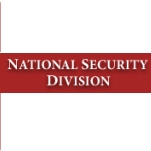The NSD was created in 2006 in response to the 2005 USA PATRIOT Improvement and Reauthorization Act. The Division was intended to consolidate counterterrorism and counterespionage sections of the Justice Department’s Criminal Division, with experts from the Office of Intelligence Policy and Review (OIPR) who specialize in the Foreign Intelligence Surveillance Act (FISA) working collaboratively under the direction of a new Assistant Attorney General.
Combining the counterterrorism, counterespionage and counterintelligence functions of the Justice Department, the National Security Division is led by the President-appointed Assistant Attorney General, and supported by a Deputy Assistant Attorney who oversees the counterterrorism and counterespionage sections, and two Deputy Assistant Attorneys General, who oversee the Law and Policy Office and FISA/ Oversight operations.
CIA Destruction of Interrogation Tapes
Reauthorization
Activists on both sides of the left-right divide are generally suspicious of increased collaboration between the OIPR and prosecutors, because FISA surveillance offers less protection for suspects than those offered by criminal courts. Democrats tend to lean towards reform and determinate limits for the controversial sections, while conservatives favor putting off reform and extending the breadth and sunset of the same provisions.
Kenneth Wainstein
Bush promoted Wainstein to Assistant to the President for Homeland Security and Counterterrorism in March 2008.
- Table of Contents
- Overview
- History
- What it Does
- Where Does the Money Go
- Controversies
- Suggested Reforms
- Comments
- Leave a comment

Mary B. McCord was appointed principal deputy assistant attorney general of the National Security Division (NSD) of the U.S. Department of Justice on October 21, 2014, and took over as acting assistant attorney general on October 15, 2016.
McCord graduated from Georgetown University Law School, and subsequently served as a law clerk for Judge Thomas Hogan of the U.S. District Court for the District of Columbia.
McCord then joined the U.S. Attorney’s Office for the District of Columbia, where she worked for nearly 20 years. She initially served as a deputy chief in the Appellate Division, overseeing and arguing cases in the U.S. and District of Columbia Courts of Appeals. She held that position for more than five years, and then worked her way up to being the U.S. Attorney Office’s criminal division chief. In that post, she oversaw all criminal prosecutions in federal district court.
Joining NSD put McCord in charge of the division’s 400 employees who collectively are tasked with carrying out the counterterrorism, counterespionage and counterintelligence functions of the Justice Department. In her post, McCord has interacted with the 94 U.S. Attorney offices across the country.
She replaced Assistant U.S. Attorney General John Carlin, who left the division to enter the private sector as chair of the global risk and crisis management team for the international law firm of Morrison & Foerster.
McCord is married to Sheldon Snook, who also worked for the U.S. Attorney’s Office for the District of Columbia. In fact, it was McCord who got her husband his job as administrative assistant and court liaison to the public and news media by recommending him to Judge Hogan. Snook also served as spokesman for the Foreign Intelligence Surveillance Court. He currently works in a similar capacity for the U.S. Supreme Court.
-Danny Biederman
To Learn More:
Interview with Mary McCord (“Communicators on the State of the Net,” C-SPAN; McCord interview begins at 20:40)
Mary McCord Testimony to the House Financial Services Subcommittee on Oversight and Investigations on subject of 2016 U.S. cash transfer to Iran (“Road to the White House,” C-SPAN; McCord testimony begins at 28:12)

John P. Carlin was confirmed as head of the National Security Division of the Department of Justice (DOJ) by the U.S. Senate on April 1, 2014. He had filled the post in an acting capacity since March 8, 2013, and was nominated to the position on a permanent basis by President Barack Obama on September 10, 2013.
Carlin was born in New York City in 1973 and grew up there. His father Roy is an attorney and his mother Patricia is a teacher and poet. Carlin attended Williams College with a junior year abroad at Oxford, earning a degree in English and political science in 1995. His college thesis was on Shakespeare as a political philosopher. After graduation, he spent a year as a program manager at Freedom House, an organization dedicated to the expansion of freedom throughout the world. He also ran the successful 1996 campaign of Gifford Miller for New York City Council. Carlin then enrolled at Harvard Law, earning his J.D. in 1999.
Carlin joined the Justice Department soon after law school as part of the Attorney General’s Honors Program, which brings top law school graduates into entry-level positions at DOJ. His first assignment was as a trial attorney in the tax division’s criminal enforcement department. Carlin remained in that post until the fall of 2001. The 9/11 attacks occurred shortly before Carlin took up a job in the U.S. Attorney’s office. It affected him deeply; during the attacks his brother-in-law was across the street from the Twin Towers and his father was riding the subway beneath the buildings.
Carlin’s initial work at the U.S. Attorney’s office involved prosecuting violent crime, fraud and public corruption. He was part of the team in 2006 that prosecuted Mitch Wade, who pleaded guilty to bribing Rep. Randy “Duke” Cunningham (R-California).
In January 2007, Carlin was named national coordinator of the Computer Hacking and Intellectual Property Program in the DOJ’s Federal Computer Crime Unit. He stayed in that job only seven months before being named special counsel to Federal Bureau of Investigation Director Robert S. Mueller. He became Mueller’s deputy chief of staff in early 2009 and in July of that year was named his chief of staff and senior counsel.
Carlin moved back to Justice in July 2011 as deputy assistant attorney general and chief of staff to then-National Security Division head Jill Monaco. When Monaco moved to the White House as assistant to the president for Homeland Security and Counterterrorism, Carlin filled her job on an interim basis.
Carlin has a reputation of trying to stay out of the spotlight and of being tight-lipped around news organizations with the National Security Division refusing to release even basic information about Foreign Intelligence Surveillance Court cases to the media.
Carlin is married to Sarah Newman, whom he met when both were at Williams. Newman is curator of contemporary art at the Corcoran Gallery in Washington. They have a daughter, Sylvie.
-Steve Straehley
To Learn More:
9/11 Attacks Helped Shape New Leader of Justice’s National Security Division (by Sari Horwitz, Washington Post)
John Carlin Speeches (C-Span)
- Latest News
- D.C. Public Schools will Teach all Second-Graders to Ride a Bike
- New Rule in Germany Limits Sales of Sex-Themed E-Books to 10pm to 6am
- What Happened to the 6-Year-Old Tibetan Boy the Chinese Government Kidnapped 20 Years Ago?
- U.S. Ambassador to Turkey Photoshops his Hair Color to Mock Turkish Mayor
- Mystery Artist Calls Attention to Unfixed Potholes by Drawing Penises around Them
The NSD was created in 2006 in response to the 2005 USA PATRIOT Improvement and Reauthorization Act. The Division was intended to consolidate counterterrorism and counterespionage sections of the Justice Department’s Criminal Division, with experts from the Office of Intelligence Policy and Review (OIPR) who specialize in the Foreign Intelligence Surveillance Act (FISA) working collaboratively under the direction of a new Assistant Attorney General.
Combining the counterterrorism, counterespionage and counterintelligence functions of the Justice Department, the National Security Division is led by the President-appointed Assistant Attorney General, and supported by a Deputy Assistant Attorney who oversees the counterterrorism and counterespionage sections, and two Deputy Assistant Attorneys General, who oversee the Law and Policy Office and FISA/ Oversight operations.
CIA Destruction of Interrogation Tapes
Reauthorization
Activists on both sides of the left-right divide are generally suspicious of increased collaboration between the OIPR and prosecutors, because FISA surveillance offers less protection for suspects than those offered by criminal courts. Democrats tend to lean towards reform and determinate limits for the controversial sections, while conservatives favor putting off reform and extending the breadth and sunset of the same provisions.
Kenneth Wainstein
Bush promoted Wainstein to Assistant to the President for Homeland Security and Counterterrorism in March 2008.
Comments

Mary B. McCord was appointed principal deputy assistant attorney general of the National Security Division (NSD) of the U.S. Department of Justice on October 21, 2014, and took over as acting assistant attorney general on October 15, 2016.
McCord graduated from Georgetown University Law School, and subsequently served as a law clerk for Judge Thomas Hogan of the U.S. District Court for the District of Columbia.
McCord then joined the U.S. Attorney’s Office for the District of Columbia, where she worked for nearly 20 years. She initially served as a deputy chief in the Appellate Division, overseeing and arguing cases in the U.S. and District of Columbia Courts of Appeals. She held that position for more than five years, and then worked her way up to being the U.S. Attorney Office’s criminal division chief. In that post, she oversaw all criminal prosecutions in federal district court.
Joining NSD put McCord in charge of the division’s 400 employees who collectively are tasked with carrying out the counterterrorism, counterespionage and counterintelligence functions of the Justice Department. In her post, McCord has interacted with the 94 U.S. Attorney offices across the country.
She replaced Assistant U.S. Attorney General John Carlin, who left the division to enter the private sector as chair of the global risk and crisis management team for the international law firm of Morrison & Foerster.
McCord is married to Sheldon Snook, who also worked for the U.S. Attorney’s Office for the District of Columbia. In fact, it was McCord who got her husband his job as administrative assistant and court liaison to the public and news media by recommending him to Judge Hogan. Snook also served as spokesman for the Foreign Intelligence Surveillance Court. He currently works in a similar capacity for the U.S. Supreme Court.
-Danny Biederman
To Learn More:
Interview with Mary McCord (“Communicators on the State of the Net,” C-SPAN; McCord interview begins at 20:40)
Mary McCord Testimony to the House Financial Services Subcommittee on Oversight and Investigations on subject of 2016 U.S. cash transfer to Iran (“Road to the White House,” C-SPAN; McCord testimony begins at 28:12)

John P. Carlin was confirmed as head of the National Security Division of the Department of Justice (DOJ) by the U.S. Senate on April 1, 2014. He had filled the post in an acting capacity since March 8, 2013, and was nominated to the position on a permanent basis by President Barack Obama on September 10, 2013.
Carlin was born in New York City in 1973 and grew up there. His father Roy is an attorney and his mother Patricia is a teacher and poet. Carlin attended Williams College with a junior year abroad at Oxford, earning a degree in English and political science in 1995. His college thesis was on Shakespeare as a political philosopher. After graduation, he spent a year as a program manager at Freedom House, an organization dedicated to the expansion of freedom throughout the world. He also ran the successful 1996 campaign of Gifford Miller for New York City Council. Carlin then enrolled at Harvard Law, earning his J.D. in 1999.
Carlin joined the Justice Department soon after law school as part of the Attorney General’s Honors Program, which brings top law school graduates into entry-level positions at DOJ. His first assignment was as a trial attorney in the tax division’s criminal enforcement department. Carlin remained in that post until the fall of 2001. The 9/11 attacks occurred shortly before Carlin took up a job in the U.S. Attorney’s office. It affected him deeply; during the attacks his brother-in-law was across the street from the Twin Towers and his father was riding the subway beneath the buildings.
Carlin’s initial work at the U.S. Attorney’s office involved prosecuting violent crime, fraud and public corruption. He was part of the team in 2006 that prosecuted Mitch Wade, who pleaded guilty to bribing Rep. Randy “Duke” Cunningham (R-California).
In January 2007, Carlin was named national coordinator of the Computer Hacking and Intellectual Property Program in the DOJ’s Federal Computer Crime Unit. He stayed in that job only seven months before being named special counsel to Federal Bureau of Investigation Director Robert S. Mueller. He became Mueller’s deputy chief of staff in early 2009 and in July of that year was named his chief of staff and senior counsel.
Carlin moved back to Justice in July 2011 as deputy assistant attorney general and chief of staff to then-National Security Division head Jill Monaco. When Monaco moved to the White House as assistant to the president for Homeland Security and Counterterrorism, Carlin filled her job on an interim basis.
Carlin has a reputation of trying to stay out of the spotlight and of being tight-lipped around news organizations with the National Security Division refusing to release even basic information about Foreign Intelligence Surveillance Court cases to the media.
Carlin is married to Sarah Newman, whom he met when both were at Williams. Newman is curator of contemporary art at the Corcoran Gallery in Washington. They have a daughter, Sylvie.
-Steve Straehley
To Learn More:
9/11 Attacks Helped Shape New Leader of Justice’s National Security Division (by Sari Horwitz, Washington Post)
John Carlin Speeches (C-Span)
- Latest News
- D.C. Public Schools will Teach all Second-Graders to Ride a Bike
- New Rule in Germany Limits Sales of Sex-Themed E-Books to 10pm to 6am
- What Happened to the 6-Year-Old Tibetan Boy the Chinese Government Kidnapped 20 Years Ago?
- U.S. Ambassador to Turkey Photoshops his Hair Color to Mock Turkish Mayor
- Mystery Artist Calls Attention to Unfixed Potholes by Drawing Penises around Them






Comments